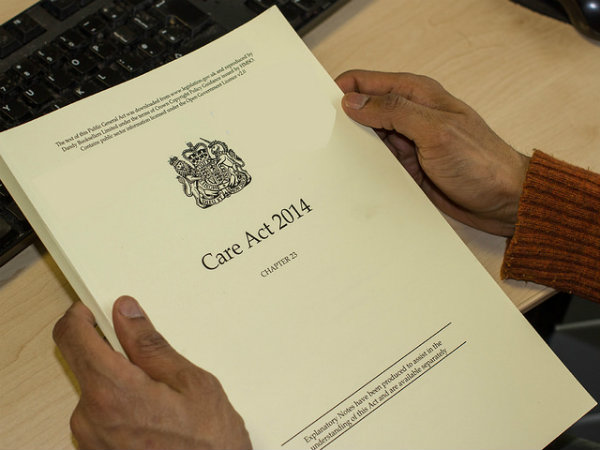
The requirement for councils to review care plans at least annually under the Care Act 2014 should be reconsidered amid concerns over its costs, a committee of MPs has said.
The Care Act statutory guidance sets out an expectation that care packages will be reviewed “no later than every 12 months”. This is not a statutory duty under the act, which says councils must keep plans under review and carry out reviews on a reasonable request from the person. However, councils must follow the statutory guidance unless they can provide legally sound reasons for not doing so.
‘Unnecessary costs’
The public accounts committee (PAC) said the impact of the policy should be tested to ensure it is not “too rigid” and placing “unnecessary costs” on local authorities at a time of huge pressure on social care funding.
The call is one of eight recommendations outlined in the committee’s report on personal budgets in social care.
Earlier this year, Community Care revealed adult social work teams were racking up backlogs of reviews due to staff shortages and increased demand. Some service users were waiting up to 18 months to be seen.
The Department of Health (DH) will report back on the committee’s findings later this year.
Market fragility
The PAC report also raised concerns over the fragility of the social care market and called on the government to “be realistic” about its responsibilities.
The DH has what it calls a stewardship role to manage the care market and workforce at the national level, but has not yet defined or communicated what this entails.
The committee said ministers must publish a national market position statement before parliament’s summer recess. This should set out how government will assess the impact of funding reductions and under what circumstances it will take action to support the care market.
Council tax rise
The DH has said that the affordability of adult social care was considered in November’s spending review, which set government spending limits from 2016-20. This led to councils being given powers to raise council tax by an extra 2% each year to fund adult social care services – known as the social care precept. Ministers also pledged to provide more funding directly to councils as part of the Better Care Fund, the government-mandated integrated budget with health, rising to an extra £1.5bn in 2019-20.
The PAC report said this was a “complacent response” to the funding pressures as the amount different local areas could raise through the precept varied hugely. The committee also cited research showing that social care would face a growing gap between available funding and the amount required to meet need, amid rising demographic and inflationary pressures.
Rising funding gap
On the government’s estimates, adult social care funding is due to rise by 0.6% per year from 2015-20, according to figures published last December by think-tanks the King’s Fund, Health Foundation and Nuffield Trust. However, cost pressures are expected to rise at 4%, excluding the impact of the new national living wage. As a result, the think-tanks estimated that the funding gap would rise from £1.2bn to £2.8bn in 2019-20.
The committee called on the DH to explain how it would ensure all personal budget holders were receiving “genuinely personalised services” amid concerns some councils were “over-stating” the number of people in receipt of personal budgets in their area.
Personalisation concerns
This could be because some councils are “less rigorous” than others in the definition they use of what constitutes a personal budget, the report said, but personalisation is also be likely to be limited by local authorities’ responses to financial pressures.
Responding to the report, a DH spokesperson said: “Through the Care Act, we have put personalisation at the heart of care to give people more choice, control and flexibility. Personalised care and its costs vary from person to person and local authorities are responsible for ensuring people get the right care.
“We are giving local authorities more money for social care – up to £3.5bn by 2019-20 – and working across government to make sure care providers have strong contingency plans in the current challenging market.”


 Bournemouth, Christchurch and Poole
Bournemouth, Christchurch and Poole  Hampshire County Council
Hampshire County Council  Lincolnshire County Council
Lincolnshire County Council  Norfolk County Council
Norfolk County Council  Northamptonshire Children’s Trust
Northamptonshire Children’s Trust  South Gloucestershire Council
South Gloucestershire Council  Wiltshire Council
Wiltshire Council  Wokingham Borough Council
Wokingham Borough Council  Children and young people with SEND are ‘valued and prioritised’ in Wiltshire, find inspectors
Children and young people with SEND are ‘valued and prioritised’ in Wiltshire, find inspectors  How specialist refugee teams benefit young people and social workers
How specialist refugee teams benefit young people and social workers  Podcast: returning to social work after becoming a first-time parent
Podcast: returning to social work after becoming a first-time parent  Podcast: would you work for an inadequate-rated service?
Podcast: would you work for an inadequate-rated service?  Family help: one local authority’s experience of the model
Family help: one local authority’s experience of the model  Workforce Insights – showcasing a selection of the sector’s top recruiters
Workforce Insights – showcasing a selection of the sector’s top recruiters 

 Facebook
Facebook X
X LinkedIn
LinkedIn Instagram
Instagram
As many LA’s have reviews 50% out of date, I see the rationale for this. However, having recently come across a service user who hadn’t been reviewed since 1996 I was appalled that they had received no input from social workers and in effect, had been abandoned in a nursing home for all of those years. More effective, time structured reviews should help ensure people like this aren’t just left like this, and that commissioners are also making sure providers are more accountable for the services they offer.